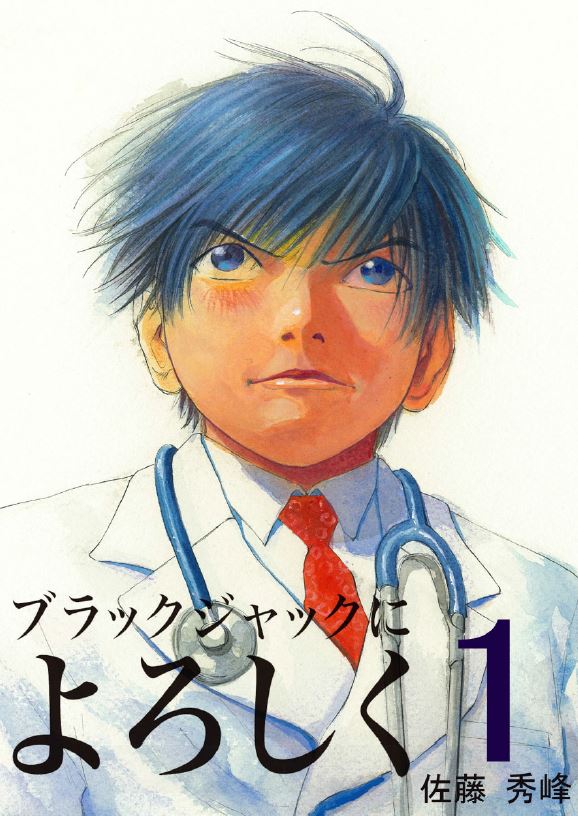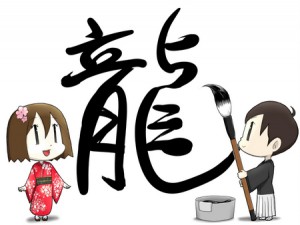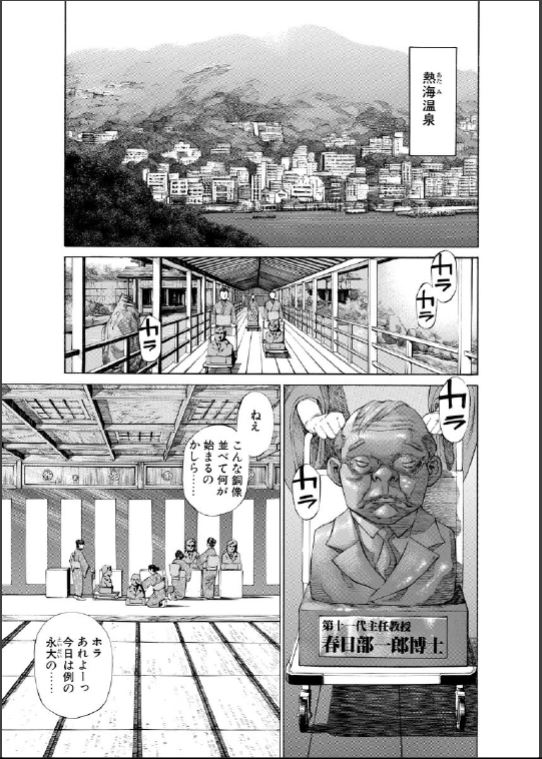*These Japanese lessons are created based on the Terms of Use of the Copyrights of them; TITLE: Give My Regards to Black Jack, AUTHOR: Shuho Sato, and WEBSITE: Manga on Web.
Japanese Lessons 1-5-1 外科と内科と医局と斎藤 / Surgery, Internists, Departments, and Saito
You can browse all of the pages by clicking the picture above and then move to any page via 「目次」 at the left. When you need English translations or explanations, please return here and refer them. This article covers from page 145 to page 164.
Japanese Script with Furigana and English Translation
(熱海温泉)(Atami Hot Springs.)
「ねえ、こんな銅像並べて何が始まるのかしら…。」「ホラあれよーっ。今日は例の*永大の…。」
“Say, why are we lining up these busts, anyway? “Remember? That whole Eiroku thing is today.”
One Point Lesson: Japanese Expression
「例の」 sometimes indicates negative nuance and could be translated as “in question”.
それでは皆さん!我らが最愛の恩師春日部教授のご挨拶です!
“Please, join me! Say hello to our beloved teacher, Dr. Kasukabe!”
(第91回永禄大学第一外科医局交流会)
(The 91st Eiroku University 1st Dept. of Surgery Meet-Up)
「我が第一外科の医局旅行も91回目です。第一外科がここまで発展いたしましたのも、ひとえに皆さん方の努力の賜物です。温泉につかるもよし、酒を飲むのもよし、今日だけは仕事を忘れ、思う存分楽しんでください。」「しかしすごい人数だな…これが全部うちの”医局”の出身者なのかよ…。」「長いあいさつは嫌われますので最後に一言…お酒を飲みすぎてはいかんぞう(肝臓)*…。」
“This is my 91st surgery department trip. It’s all thanks to your hard work that the department has become what it is today. Relax in the hot spring, have a drink or three… Forget about work today and just enjoy yourselves.” “Check out this crowd. Are all these people seriously from our department?” “I don’t want to keep you too long, so I’ll leave you with this… If you’re looking to get drunk, alcohol really de-livers!”
One Point Lesson: Japanese Expression
This is a Japanese pun between 「肝臓 (liver)」 and 「いかんぞう」. If we plainly said the latter phrase, it would be like「いけないぞ」. 「いけない」 means prohibition like “must not” and that’s equivalent to its dialect; 「いかん」. 「ぞ」 is a sentence-ending particle indicating emphasis. 「う」 is just an elongated sound.
「ちょ、何やってんですか白鳥先生!?」「お前らも脱げ。。第一外科医局こう例*の白フン胴上げ祭だ。」「万歳~!春日部教授万歳~!春日部教授万歳~!」
“Hey, what are you doing, Dr. Shiratori?” “Shirts off, you guys! It’s the first dept. of surgery loincloth lift up!! ” “Ka-su-ka-be! Hip, hip, hooray! Ka-su-ka-be! Hip, hip, hooray!”
One Point Lesson: Japanese Expression
「こう例」 is usually written in Kanji like this 「恒例」. However, in Japanese, some people don’t prefer writing some words in Kanji in row. We guess that’s why the author used Hiragana on purpose.
「これが医者の世界だ。よく見とけ、斉藤…。医者も会社員と同じだ。医師としての実力がある者が出世するとはかぎらない*。”医局”という社会の中でうまく立ちまわった者が上へ行く。」
“This is a doctor’s world, Saito. Take a good, close look… Doctors are no different from company employees. Sheer skill alone won’t get you anywhere here. But enough wheeling and dealing in this “company” and you’ll go far.”
One Point Lesson: Japanese Grammar
「~とはかぎらない」 is often seen when people try to explain something or persuade someone. That can be translated as “not always” or “not necessarily” and can be used like this 「高いものが必ず安いものよりも良いとはかぎらないよ。 (Expensive things are not always better than cheap things)」.
医局という言葉に、皆さん聞き覚え*があると思う。大学病院では、第一外科医局、第一内科医局、眼科医局という具合に各科がそれぞれ”医局”という共同体をつくっている。大学病院勤務中の者はもちろん、国公立や私立の病院に勤めている医師、さらには町の開業医まで、ほとんどの医師はどこかの大学病院に出身医局がある。
Most people are probably familiar with the phrase “clinical” department. In university hospitals, each medical specialty creates a community known as a “department”: the 1st Dept. of Surgery, the 1st Dept of Internal Medicine, the Dept of Ophthalmology. Indeed, just about every doctor, whether in a university hospital, public hospital, private Hospital, or a local family practice is an alum of some university hospitals clinical department.
One Point Lesson: Japanese Vocabulary
This expression; 「聞き覚え」 can be literally translated as “have heard” and is utilized for other purpose as well such as 「見覚え (have seen)」.
「教授、ウチの病院にもう少しベテラン医師を回してもらえませんか?」 「教授、どうか私め*を助教授に…。」
“Doctor! We could really use more veteran doctors at our hospital…” “Oh, Dr. Kasukabe! Please let me be your assistant professor.”
One Point Lesson: Japanese Expression
「め」 is a suffix indicating your humility. However, that’s used in very formal situations or when joking. In this manga, the author tried to express how ridiculous it is to respect the doctor as Gods using 「め」.
ではなぜ大学病院に勤務していない者までが医局の指示に従うのか?
So if you’re not at a university hospital, why take directions from a clinical department?
「春日部第一外科バンザーイ!」
“Long live Kasukabe and 1st surgeryyy!”
日本中の病院は、A病院は東大系*、B病院は慶応系、というように、そのほとんどがどこかの大学病院の“系列”に属している。
Japanese hospitals are almost all affiliated with some university hospital or other. Hospital A is affiliated with Tokyo University, Hospital B with Keio University, and so on.
「教授、実は勤務している病院の院長が○○大系に替わりまして。」
“The chief of staff at my hospital just changed our affiliation to Y University…”
One Point Lesson: Japanese Vocabulary
「系」 can indicate “group”, “lineage” or “system”.
もちろん系列とはいえ資本関係があるわけではない。しかし大学医局はその系列病院の人事権を握っている*のである。もしも民間病院が新たな医師を必要とした場合、その病院は大学の医局に相談して医師を派遣してもらう。つまり民間病院は医師の確保を大学医局に頼るしかなく、医師も医局に所属しないと就職先を見つけることは難しい。決して背けない組織という意味で “医局マフィア”なんて呼ぶ人もいるくらいだ!そして人事権を含め、医局の全権力を握るのが医局のドンたる教授ということになる。
These affiliations aren’t financial ones, of course. But university clinical departments have authority over personnel in their affiliate hospitals. If a private hospital needs a new doctor, they’ll discuss it with the university’s clinical department, who’ll send one over. In other words, private hospitals have to ask the university to find them a doctor, and if a doctor doesn’t belong to any department, good luck finding a place to work. There’s no escaping from this organization, which is why some people even call it the “Medical Mafia”! And who wields the department’s power over HR and everything else? The department’s idiot teachers, that’s who.
One Point Lesson: Japanese Vocabulary
「握る」 means “to clasp”, “to grasp” or “to grip” and can be used for intangible things such as 「権力 (power)」 and 「秘密 (secret)」.
「医局に入れば、教授が神様。出世も何もかもが教授の御心次第ってわけだ。」
“In a clinical department, the teachers are gods. Whether you soar high or crash and burn is entirely up to them.”
「虫垂周囲の炎症が強いな。根部の癒着から剥離していくぞ。」「…はい!」
“Severe Inflammation around the appendix… We’ll separate it, starting from the adhesion at the root.” “Yes, doctor!”
「僕って外科に向いてないのかな。」「え?」「だって手術がうまくても、偉くなるのは世渡り上手*な人なんだろ?そんなの…なじめないよ。」
“Maybe I’m not cut out for surgery.” “Huh?” “No matter how good you are, you’ll never make it big if you can’t work the system. And I can’t get used to that. ”
One Point Lesson: Japanese Vocabulary
「世渡り上手」 is a Japanese idiom and means “good at getting on in the world”.
「そりゃ外科とか内科は関係ないだろ?どこの科に行っても一緒だよ。ま、お前が外科向きじゃないってのは本当かもな。外科ってのは、きったはったの体育会*ノリの世界だからな。それより合コンしよーぜ、合コーン。」「またそれかよ。」
“Nothing to do with surgery particularly. Surgery, internal medicine — it’s the same wherever you go. But, hell, surgery might not be the place for you after all. It’s more a rough-and-tumble, phys-ed kind of world. Look forget all that! It’s date night!” “not again…”
[adsense]
One Point Lesson: Japanese Culture
In Japan’s school days, a certain number of students participate in sport club activities. Some of the sport clubs have highly strict discipline and force students to be obedient and to do anything that superior people want. That’s like an army. A world like this can be called 「体育会」.
(看護婦休憩室) (Nurses’ Break Room)
「ヘイヘイ看護婦さーん、合コンしないかーい*。医者って女性が結婚したい相手のナンバー1 なんだぜ、イエーイ。」「研修医って給料安いじゃん。時間もないしプライドだけは高いし、結婚相手には最低ね。」「くそー、死んでやるー、白衣の天使なんていないんだー。」
“Hello, Ladies! Feel like going out tonight? Women always wanna marry doctors, amirite? Aw, yeah!” “An intern’s salary is the pits. No money, no time — but plenty of pride. Not an ideal husband, if you ask me.” “That does it! Might as well of myself! So much for the angel in white…”
One Point Lesson: Japanese Expression
If people elongate the end of sentences, the tone will be casual and this expression may be considered as kind of joking.
「大変です先生!509号室のおばあさんが吐血しました!」
“Doctor! The woman in 509 is vomiting blood!”
医療の目的は…人を病気やケガから守る事じゃないんだろうか…?どうして医局があったり…権力者がいたりするんだろう…。医者って一体…
What’s the point of medicine? To protect people from illness and injury? Then why all the departments… and the tyrants in them? What is a doctor, anyway…?
「フーッ、当直明けにこっそり*抜けだして飲むビールってのは最高だな。」「最高だなんて、先生…。結局、あのおばあさん、亡くなっちゃったんですよ…。」「自意識過剰だよ。いちいち落ち込んでちゃ仕事にならんぞ。」「もうすぐ9月か。君の第一外科での研修ももうすぐ終わりだな。これから君達研修医はいろんな科で研修をつんでいく事になる。だが斉藤先生、最終的には我が第一外科医局に戻ってこいよ。」「あの…白鳥先生、医局ってどうして入らなきゃいけないんですか…?」「もちろん強制ではないが…。そうなると研修後の勤務先の病院は、自分で探さなきゃいけなくなるぞ。なんとか自力で勤務先を見つけた所で、院長はもちろん、各科の部長など主要なポストは大学の医局におさえられている。出世コースは絶望だ。基礎的な研究はできないから論文はほとんど書けないし、学位も取れなくなる。小さな民間病院で一生“はぐれ医者”として細々と生きていくしかなくなるぞ…。医局制度にどんな不満があるのか知らんが、不満があるなら自分が権力を握って変えるしかないんじゃないのか?」
“Ahh… Nothing beats the beer you sneak out to drink after your shift.” “Geez, Dr. Shiratori… That woman ended up dead.” “Stop being so self-conscious. How can you work if you let everything get to you?” “Almost September already. Your internship with 1st surgery is nearly over. You interns will be spending time with all kinds of specialties from here on out. But listen, Dr. Saito… I expect you to come back to 1st surgery when it’s all over.” “Dr. Shiratori? Why do we have to be part of a department, anyway?” “Well, it’s not mandatory, of course… But without one, you’re on your own with your post-internship job hunt. And even if you do happen to find a position at some hospital, the chief and the department heads will save the best jobs for those in the university’s clinical department. The fast track is hopeless. You can barely write a thesis if you can’t do basic research — and forget about getting a degree. Then you’re left eking out an existence at a tiny private hospital as a “rogue doctor”. I don’t know what your beef is with the department system, but it’s up to you to take charge and fix it.”
One Point Lesson: Japanese Vocabulary
「こっそり」 is a Japanese onomatopoeia. This indicates “in private” or “in secret” and is used like this 「こっそり彼女に手紙を渡した。(I slipped the letter to her)」.
そして、そんな言葉を最後に僕の第一外科での研修は終わった。
And with those words, my internship at the 1st Dept. of Surgery was over.
9月、僕たちの新たな研修生活は始まっていた。第一内科、永大では循環器疾患、つまり高血圧や狭心症など、主に心臓の病気を扱っていて、循環器内科とも呼ばれている。
September. Our new internship — our new lives — were just beginning. 1st Dept. of Internal Medicine. At Eiroku, cardiovascular disease — things like hypertension and angina that chiefly affect the heart — is also called cardiovascular medicine.
「皆さん…この箱の中身が何か分かりますか…?それを知ろうとしたとき、外科医の連中*は箱を開けて中身を確かめるしか能がありません…我々は箱を開けずに音や重さで中身をあてる。それが内科医なのです。」
“Ladies and gentlemen, do you know what’s in this box? When it comes time to find out, all those surgeons can do is open the box and look inside. But we keep it closed and guess what’s inside based on its weight or the sound it makes. That’s internal medicine.”
One Point Lesson: Japanese Vocabulary
「連中」 can be translated as “lot”. This has a negative nuance and is used when people look down on someone.
「君の指導医の久米だ。これから君の受け持ち患者を紹介する。ここだ。」
“I’m Kume. I’ll be your attending. Let’s go meet your patient. In here.”
宮村和男、38歳。後に僕は…この患者を巡って“医局”と壮絶な闘いを繰り広げる事になる。
Kazuo Miyamura, 38 years old. Little did I know I would soon be bravely battling the “Medical Mafia” over this very patient.
Recommended Links
Program Table of Japanese Lessons

Japanese Lessons: Learn Japanese Expressions with Manga 1-7-1

Just 51 Key Radicals, How to Memorize Kanji



